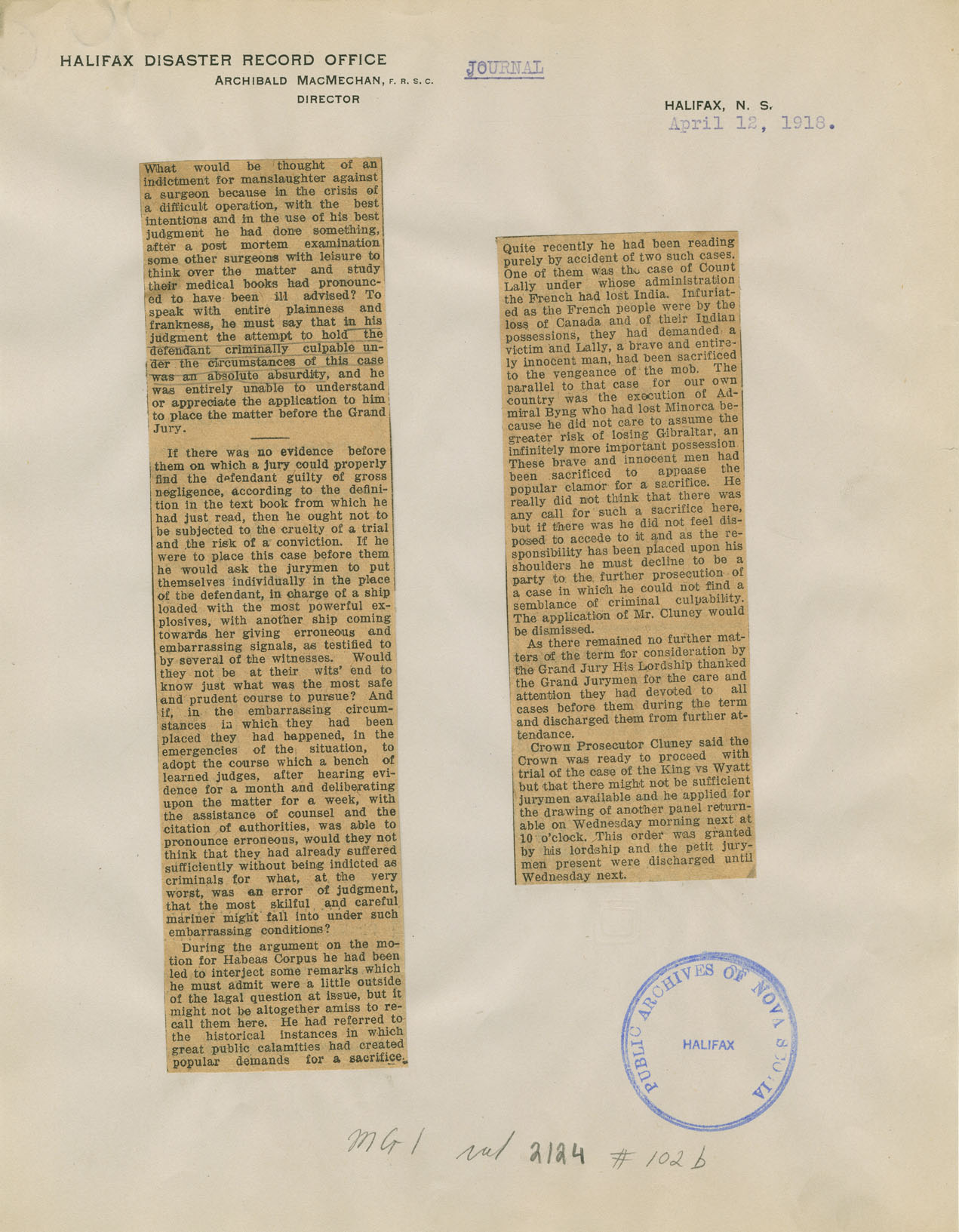Nova Scotia Archives
Archibald MacMechan
Halifax Disaster Record Office Materials
"Journal", clippings
12 April 1918. — 3 pages : 30 x 39 cm.
note: transcription publicly contributed - please contact us with comments, errors or omisions
HALIFAX DISASTER RECORD OFFICE
ARCHIBALD MACMECHAN, F.R.S.C.
DIRECTOR
HALIFAX, N.S.
April 12, 1918.
JOURNAL
[Newspaper clipping]
What would be thought of an indictment for manslaughter against a surgeon because in the crisis of a difficult operation, with the best intentions and in the use of his best judgement he had done something, after a post mortem examination some other surgeons with leisure to think over the matter and study their medical books had pronounced to have been ill advised? To speak with entire plainness and frankness, he must say that in his judgement the attempt to hold the defendant criminally culpable under the circumstances of this case was an absolute absurdity, and he was entirely unable to understand or appreciate the application to him to place the matter before the Grand Jury.
If there was no evidence before them on which a jury could properly find the defendant guilty of gross negligence, according to the definition in the text book from which he had just read, then he ought not to be subjected to the cruelty of a trial and the risk of a conviction. If he were to place this case before them he would ask the jurymen to put themselves individually in the place of the defendant, in charge of a ship loaded with the most powerful explosives, with another ship coming towards her giving erroneous and embarrassing signals, as testified to be several of the witnesses. Would they not be at their wits' end to know just what was the most safe and prudent course to pursue? And if, in the embarrassing circumstances in which they had been placed they had happened, in the emergencies of the situation, to adopt the course which a bench of learned judges, after hearing evidence for a month and deliberating upon the matter for a week, with the assistance of counsel and the citation of authorities, was able to pronounce erroneous, would they not think that they had already suffered sufficiently without being indicted as criminals for what, at the very worst, was an error of judgement, that the most skilful and careful mariner might fall into under such embarrassing conditions?
During the argument on the motion for Habeas Corpus he had been led to interject some remarks which he must admit were a little outside of the lagal question at issue, but it might not be altogether amiss to recall them here. He had referred to the historical instances in which great public calamities had created popular demands for a sacrifice.
Quite recently he had been reading purely by accident of two such cases. One of them was the case of Count Lally under whose administration the French had lost India. Infuriated as the French people were by the loss of Canada and of their Indian possessions, they had demanded a victim and Lally, a brave and entirely innocent man had been sacrificed to the vengeance of the mob. The parallel to that case for our own country was the execution of Admiral Byng who had lost Minorca because he did not care to assume the greater risk of losing Gibraltar, an infinitely more important possession. These brave and innocent men had been sacrificed to appease the popular clamor for a sacrifice. He really did not think that there was any call for such a sacrifice here, but if there was he did not feel disposed to accede to it and as the responsibility has been placed upon his shoulders he must decline to be a party to the further prosecution of a case in which he could not find a semblance of criminal culpability. The application of Mr. Cluney would be dismissed.
As there remained no further matters of he term for consideration by the Grand Jury His Lordship thanked the Grand Jurymen for the care and attention they had devoted to all cases before them during the term and discharged them from further attendance.
Crown Prosecutor Cluney said the Crown was ready to proceed with the trial of the case of the King vs Wyatt but that there might not be sufficient jurymen available and he applied for the drawing of another panel returnable on Wednesday morning next at 10 o'clock. This order was granted by his lordship and the petit jurymen present were discharged until Wednesday next.
PUBLIC ARCHIVES OF NOVA SCOTIA
HALIFAX
MG 1 volume 2124 number 102 b
Reference: Archibald MacMechan Nova Scotia Archives MG 1 volume 2124 number 102

